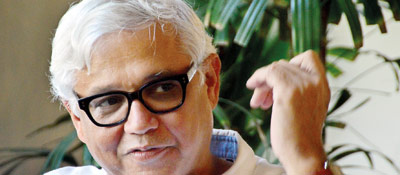Writer on the move
What would Kesari do? As Amitav Ghosh stood arguing with a taxi driver, a character from his book popped into his head.
For Ghosh, who in 2015 brought his enormously ambitious Ibis Trilogy to completion with the release of Flood of Fire, this is what it means to live with the people he writes into being.
It’s difficult to imagine how Havildar Kesari Singh of the Bengal Native Infantry’s 25th regiment would handle a truculent New York cabbie, but Ghosh has fun trying anyway.
“When you imagine a character it is not only an abstract thing. They become real because you imagine them in real situations. You imagine their responses and you think of what it’s like to be with them,” he says.
The last time Ghosh was in Sri Lanka, it was in 2005, and he was just about to begin writing Sea of Poppies, the first in a trilogy that would take 10 years of his life, sprawl over 1,600 pages and involve more than a million words.
From the workers slaving away in the Ghazipur opium factory, to the homes of Parsi merchants in Calcutta and all the way to China and the shores of Hong Kong, his fictional recreation of the events leading up to the first opium war of 1839-42 would challenge Ghosh as none of his previous books ever had.
Connecting all the dots was the ship Ibis, on which many of the main characters meet for the first time before circumstance scatters them, and through which they remain bound in often surprising ways.
Though Ghosh has long frustrated curious journalists by describing his approach as being “nothing more than to blunder along,”he still admits that he has grown tremendously as a writer.
Ghosh simultaneously researched and wrote each book. Though character-driven, writing historical fiction required Ghosh to understand how opium traders operated, how a Parsi widow would welcome a guest, or exactly what kind of ships were deployed by the British as they hammered the Chinese into submission.
In particular, no historian had analysed the military engagements, and so Ghosh was in fact conducting primary research in some cases.
“I could never have done the Ibis trilogy, earlier in my life – the sort of technical skills that were called for, the organisational and descriptional skills, the structural knowledge, all these things I had never possessed before.
It really called on everything I had ever done.”As he rose to meet the challenge, the world around him too was altered in unimaginable ways.
“I could not even begin to chronicle all the shifts – just think of how much Sri Lanka itself has changed,” he says.
That Ghosh was in Sri Lanka both at the beginning and end of his trilogy is not as much of a coincidence as you may think. His ties to this country are deep, reaching back into his childhood.
The son of an Indian diplomat once posted in Colombo, Amitav lived here as a boy and was enrolled in Royal College. He still has surprisingly vivid memories of his classmates, his teachers and even the cane used to discourage them from talking in the classroom.
Every weekend, the family would leave the city behind to travel across the island and Ghosh credits those earliest experiences with embedding in him a lifelong love of travel. “There were so many places to see,” he says, “It’s no surprise it became an addiction.”
In his novels, Ghosh often uses travel as a device to drive the transformation of his characters – women discover their freedom, men their limitations, and both are thrown together in to a maelstrom of history.
It has certainly transformed the author’s own life. “My family has been on the move since the mid-19th century,” says Ghosh. “We were originally from Bangladesh, but then the entire family scattered all over the place – to Burma and Germany.
I feel very grateful to my family, because they have given me so much to write about.” According to family lore, they first left their home in Bangladesh, because the river changed course and drowned the village.

Ghosh has said that in some sense his travels began with his family becoming ecological refugees.
Ghosh has journeyed extensively for study, work and pleasure. He completed an MA in social anthropology in Delhi before moving to Oxford to complete a PhD in the same subject.
He would return to Egypt many times, where as a student anthropologist he immersed himself in village life (maintaining a journal all the while which he says taught him a great deal about how to write character and dialogue).
He has taught in American colleges including Colombia and Harvard and now he and his wife, the writer Deborah Baker divide their time between Calcutta, Goa and Brooklyn.
Today, pointing eastward from a verandah in Galle to where the Mergui Archipelago lies, he tells me he just finished a sailing trip through those turquoise waters aboard a 110-year-old schooner.
Sailing was one of the things that Ghosh learned to do while writing the Ibis trilogy. “These for me are the fun parts of writing fiction – visiting interesting and out-of-the-way places, of having strange and marvellous experiences,” he says.
He also began to watch a lot of wrestling (an art his character Havildar Kesari Singh is proficient in), which coincided serendipitously with his son developing a keen interest in the sport.
Ghosh laughs as he assures me: “He was a very good wrestler. It gave me a very visceral sense of what wrestling is about. There is nothing scarier than to watch your little boy being set upon by another little boy.”
In writing the book, Ghosh also developed a working knowledge of Cantonese, which he practised on the owner of their neighbourhood laundromat.
The author already speaks Bengali, Hindi, French, Arabic and English – a linguistic diversity which is reflected in the characters populating the Ibis trilogy.
The groundwork for Ghosh’s linguistic agility as a writer was actually laid in Sri Lanka. “Sri Lankan English was very distinctive, and that was the language we learned.
The English we spoke, say even on the playing fields of Royal College, has a completely different tonality.” His research revealed that the island’s speech drew unabashedly on the various trading languages of the Indian Ocean.
“It was a kind of nautical language that emerged from the world of the Ibis trilogy, and so it was interesting for me to use this language, these various registers of English in various ways.”
In fact, Ghosh is a fan of Carl Muller, who he feels uses English in a particularly innovative way. He so admired the Sri Lankan author of the Jam Fruit Tree that he actually landed up – with his wife and children in town – on Muller’s doorstep in Kandy in 2005.
Muller, recently remarried, had on a singlet and pair of shorts and had apparently been fixing a vehicle, possibly a motorbike, but he gave Ghosh wand his family a warm welcome.
In fact, Ghosh seems hard pressed to relate an encounter with Sri Lanka that has not been memorable. When he landed here in 2001, to deliver the annual NeelanTiruchelvam lecture, it was to see the runway bordered with wrecked planes – the result of the LTTE attack on Bandaranaike Airport.
In the same visit, he spent time with Arthur C. Clarke who he was pleased to discover was a fan. He had tour of Clarke’s remarkable library, and the two even played table tennis according to the legendary science fiction writer’sown rules.
We find ourselves returning to science fiction when we talk of Ghosh’s upcoming publication – a collection of lectures and essays on climate change and why art and literature has struggled to reckon with climate change in any significant way.
Sci-Fi writers were among the earliest to engage with environmental catastrophe in a really immersive sense, but Ghosh is surprised by how the unfolding events in Asia have not stirred the literary community to a greater degree.
In Bangladesh alone some 100 million people are estimated to live within the danger zone – vulnerable to the smallest rise in sea-level.
Ghosh speculates over what damage a really strong storm surge could do in Galle.In the mangrove forests of the Sundarbans, where he set his novel The Hungry Tide, several islands have been submerged in the last few years, displacing thousands.
“That is one of the things I am trying to understand – why is it that in contemporary fiction and arts, it’s very easy to engage with questions of identity, but it is so hard to engage with the non-human?”
Meanwhile, Ghosh will be signing copies of the Ibis trilogy for some time to come. His readers share with him both the fulfilment and the sense of loss that comes with the end of this wonderful series.
Ghosh is almost wistful as he speaks of moving on to other projects and commitments: “The writing gave texture to my days. Every day would be different.”
Despite having enjoyed so much the process of researching the book, of learning how to sail, of engaging with readers or understanding the intricacies of a new language, he says it is the act of writing itself that he loves best.
“It is just every day you are doing something you love. At the end of every day, every single day, I just think to myself how lucky I am to do this.”


